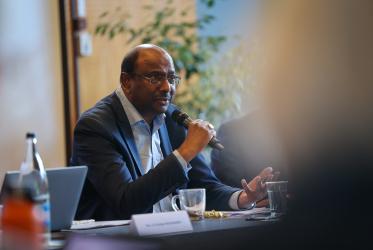At a consultation in Seoul on December 7-11, participants from churches throughout northeast Asia shared insights on diakonia and how vital it is to the nature and mission of the church.
Rev. Dr Siu-Chu Simon Chow, president of the Lutheran Theological Seminary in Hong Kong, was one of some two dozen people who gathered. He said the consultation underscored how the church needs to focus on the motivation for service.
“Most of the traditional established churches in Hong Kong have big social service programs. Yet about 95 percent of the churches’ work is funded by the government,” he said, meaning the government imposes standards for the work and the social workers who carry it out. There are good aspects to such a structure, Chow said, but not all needs are met.
“The social workers are well educated in the university, so we don’t have to teach them about social work,” he said. “But we do want them to understand why we do social work, and what our motivation is behind it.”
A World Council of Churches (WCC) document, Ecumenical Diakonia, will help in that task, Chow said. Participants in the consultation focused their discussion around reflections on the 99-page study.
Weighing local contexts
Rev. Dr Martin Robra, WCC programme executive for Ecumenical Continuing Formation, said he was pleased with the generally positive response to the document.
“Once people understand that this document addresses issues at a global level, they begin to recognize how similar issues surface in their own context,” he said. “Studying ecumenical diakonia needs to involve a bottom-up component where people express their own concerns and share those with others.”
South Korea was a good place to start the process of reviewing the document, Robra added. “Our member churches in Korea share a legacy of resistance to military dictatorship, of support for community organizing, and they are committed to a bottom-up approach, to reflecting on these issues from the perspective of those who live on the margins.”
Robra said the WCC will continue to explore how the document can inspire reflection and action by member churches in different contexts around the world. He expects similar consultations will soon take place in Latin America and Africa.
Building reflection on service
“Diakonia is a very neglected issue within our east Asian context, especially given the strength of Confucianism. So this document will be helpful to our churches,” said the Rev. Joshua Lian of the Presbyterian Church in Taiwan. “That’s not to say that our churches aren’t already doing diakonia, but we often do it without appropriate reflection. There are a lot of faithful believers who just go ahead and serve, but their reflection about that action isn’t well organized.”
Lian said the diakonia study needed grounding in local contexts. “The WCC does good work, but it’s very far away from East Asia. So I will try my best to do the bridging work,” he said. “The people in my church are happy to have this kind of challenge from the ecumenical world.”
The Rev. Dr. Young-Cheol Cheon, a pastor in the Presbyterian Church in Korea who serves as general secretary of Korean Diakonia, said the document will gain in value as it is interpreted by local churches.
“It’s a kind of top-down document, and lacks reflection from a local perspective,” he said. “That’s not surprising, given that Geneva is in Europe but most WCC member churches are in Africa, Asia, and Latin America. That can be a big distance, even though we are all members of the same body. So the WCC needs to listen carefully to local voices if the document is going to be useful to local churches.”
Cheon and other participants in the Seoul gathering suggested writing several study guides for the document, each written for a particular context.
More photos from the Ecumenical diakonia consultation in Seoul
Ecumenical diakonia: sharing God’s gifts at all tables (WCC press release 05 October 2017)







